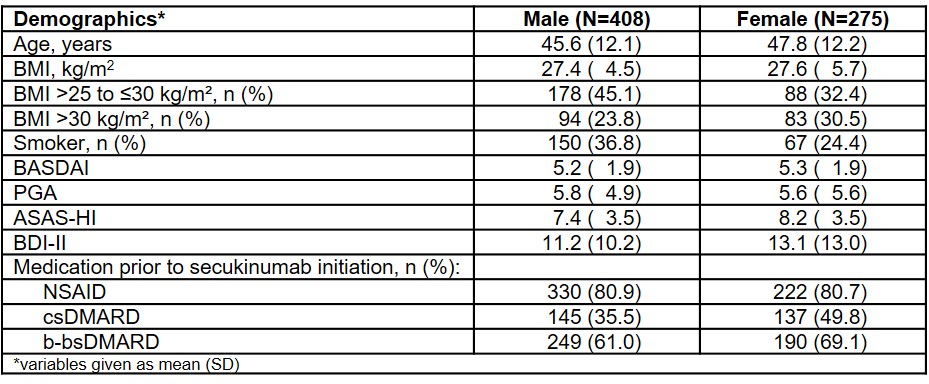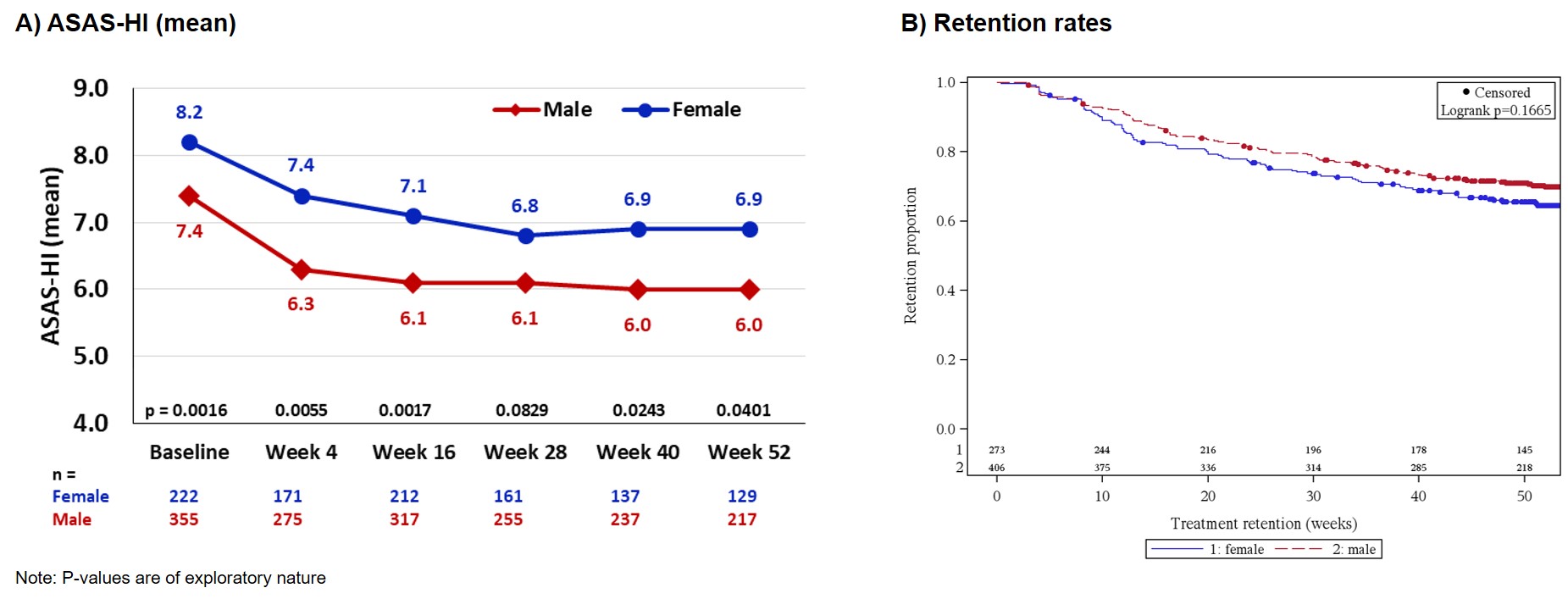Session Information
Date: Sunday, November 7, 2021
Title: Spondyloarthritis Including PsA – Treatment Poster I: Axial Spondyloarthritis (0908–0939)
Session Type: Poster Session B
Session Time: 8:30AM-10:30AM
Background/Purpose: Current studies suggest that the phenotype of spondyloarthritis differs between genders and that this may influence the subsequent diagnostic approach and therapeutic decisions1. The German non-interventional study AQUILA provides real-world data on the influence of gender on therapeutic effectiveness and retention rate under treatment with secukinumab, a fully human monoclonal antibody that selectively inhibits interleukin-17A.
The aim of this interim analysis is to describe selected baseline (BL) demographics, to evaluate secukinumab treatment outcomes on disease activity, depressive mood and retention rate depending on the gender of PsA patients.
Methods: AQUILA is an ongoing, multi-center, non-interventional study including more than 3000 patients with active AS or psoriatic arthritis. Patients were observed from BL up to week (w) 52 according to clinical routine. Real-world data was assessed prospectively and analyzed as observed. Validated questionnaires were used to collect data on disease activity (Bath Ankylosing Spondylitis Disease Activity Index, BASDAI), global functioning and health (Assessment of SpondyloArthritis-Health Index, ASAS-HI) and severity of depressive mood (Beck´s Depression Inventory version II, BDI-II). Patient reported outcomes were reported using patient´s global assessment (PGA). In addition, retention rates (time from study inclusion until premature secukinumab treatment discontinuation) were assessed through Kaplan-Meier plots. This interim analysis focuses on the subgroups of male and female AS patients.
Results: At BL, 683 AS patients were included: 59.7% (n=408) male and 40.3% (n=275) female. Demographic data (Table 1) of male and female AS patients differed numerically in the following parameters: proportion of obese patients, smokers, pretreatment with disease-modifying antirheumatic drugs (csDMARDs), and biologicals/biosimilars (b-bsDMARDs).Mean BASDAI and PGA were comparable between male and female AS patients over time (♂: 5.2 at BL to 3.8 at w52, ♀: 5.3 at BL to 4.1 at w52 and ♂: 5.9 at BL to 4.1 at w52, ♀: 5.6 at BL to 4.3 at w52, respectively). Mean ASAS-HI over time was higher in women; nevertheless, improvements in global functioning were comparable for both genders from BL to week 52 (Fig. 1A). Severity of depressive mood was numerically lower in male patients; nevertheless, BDI-II reductions were comparable across the genders (♂: 11.2 at BL to 10.0 at w52, ♀: 13.1 at BL to 11.0 at w52). Secukinumab treatment retention rate for men was (not significantly) higher than for women (Fig. 1B).
Conclusion: In a real-world setting, secukinumab improved disease activity, global functioning and severity of depressive mood in AS patients in both men and women. Women showed overall higher disease burden. Altogether, real-world data of this interim analysis are in line with those of Phase 3 studies and show that secukinumab is an effective treatment up to 52 weeks with high treatment retention rates, irrespective of gender.
To cite this abstract in AMA style:
Kiltz U, Brandt-Jrgens J, Kästner P, Riechers E, Peterlik D, Tony H. How Does Gender Affect Secukinumab Treatment Outcomes and Retention Rates in Patients with Ankylosing Spondylitis? – Real World Data from a German Observational Study [abstract]. Arthritis Rheumatol. 2021; 73 (suppl 9). https://acrabstracts.org/abstract/how-does-gender-affect-secukinumab-treatment-outcomes-and-retention-rates-in-patients-with-ankylosing-spondylitis-real-world-data-from-a-german-observational-study/. Accessed .« Back to ACR Convergence 2021
ACR Meeting Abstracts - https://acrabstracts.org/abstract/how-does-gender-affect-secukinumab-treatment-outcomes-and-retention-rates-in-patients-with-ankylosing-spondylitis-real-world-data-from-a-german-observational-study/


